CGS Newsletter 010 Available Now!
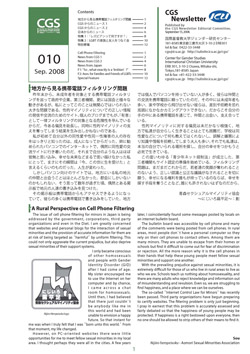 The tenth issue of the CGS Newsletter is now available both in print and online. Click the URL to download the PDF version.
The tenth issue of the CGS Newsletter is now available both in print and online. Click the URL to download the PDF version.
Contents of the CGS Newsletter 010
CGS Newsletter 010 Available Now!
 The tenth issue of the CGS Newsletter is now available both in print and online. Click the URL to download the PDF version.
The tenth issue of the CGS Newsletter is now available both in print and online. Click the URL to download the PDF version.
Contents of the CGS Newsletter 010
Sou
Nijiiro hempeisoku - Aomori Sexual Minorities Association
【The article below is the same as the article that appears in the tenth issue of the CGS Newsletter.】
 The issue of cell phone filtering for minors in Japan is being addressed by the government, corporations, third party organizations and even in the Diet. I am greatly concerned that websites and personal blogs for the interaction of sexual minorities and the provision of accurate information for them are at risk of being targeted as “harmful” by uniform filtering. This could not only aggravate the current prejudice, but also deprive sexual minorities of their support systems.
The issue of cell phone filtering for minors in Japan is being addressed by the government, corporations, third party organizations and even in the Diet. I am greatly concerned that websites and personal blogs for the interaction of sexual minorities and the provision of accurate information for them are at risk of being targeted as “harmful” by uniform filtering. This could not only aggravate the current prejudice, but also deprive sexual minorities of their support systems.
Yuko INOUE
Co-ordinator for Japan, Japan-UK LGBT Youth Exchange Project
ICU Center for Gender Studies
【The article below is the same as the article that appears in the tenth issue of the CGS Newsletter.】
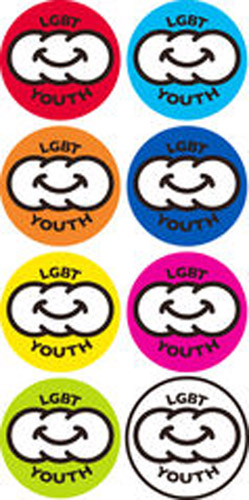 The situation for LGBTs has seen great change in the last five years. In the UK, legislation has been passed to prevent discrimination based on sexual orientation and same-sex couples have been granted similar legal rights to those of heterosexual married couples. In Japan, an assembly member has publicly come out as a lesbian and there are many LGBT groups which are becoming more and more active.
The situation for LGBTs has seen great change in the last five years. In the UK, legislation has been passed to prevent discrimination based on sexual orientation and same-sex couples have been granted similar legal rights to those of heterosexual married couples. In Japan, an assembly member has publicly come out as a lesbian and there are many LGBT groups which are becoming more and more active.
Yet, are questioning LGBT youth finding it easier to access information or meet people to help them understand their sexuality? The answer is no. In fact, they are more liable to be exposed to negative information concerning homosexuality or the transgression of gender norms, so it is still difficult for them to accept themselves as they are. This kind of negative information and the lack of support for LGBT youth in education is becoming the largest hotbed for bullying due to homophobia and transgender abhorrence. In both Japan and the UK, many LGBT youth are the victims of bullying, and some are pushed to the point of contemplating or actually attempting suicide. At the same time, there are many LGBT youth who are struggling in their respective ways and situations to overcome these difficulties and transform the prejudice into understanding. In the movement to create a society that protects the rights of not only LGBT but people we cannot ignore the infinite possibilities that this type of initiative holds.
Yukiko HOSOMI
Co-ordinator for UK, Japan-UK LGBT Youth Exchange Project
【The article below is the same as the article that appears in the tenth issue of the CGS Newsletter.】
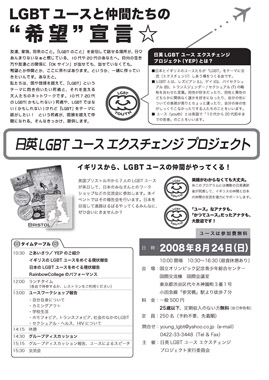 When it is hard enough to meet other LGBT young people in our own countries, why do we cross over borders trying to meet others who live thousands of miles away? Paradoxically this is the very reason why we are holding this LGBT youth exchange. The exchange creates a space for young people and all involved to find themselves as well as each other in societies where heteronormativity and gender stereotyping attempt to wipe out and disadvantage the existence of any nonconformist. Additionally, being young makes LGBT youth a minority in LGBT communities. While coming-out is still a big issue for most LGBTs, it is even harder for young people to do so when their lives are dependent on parental care. This is still the case, not only in Japan, but also in the UK.
When it is hard enough to meet other LGBT young people in our own countries, why do we cross over borders trying to meet others who live thousands of miles away? Paradoxically this is the very reason why we are holding this LGBT youth exchange. The exchange creates a space for young people and all involved to find themselves as well as each other in societies where heteronormativity and gender stereotyping attempt to wipe out and disadvantage the existence of any nonconformist. Additionally, being young makes LGBT youth a minority in LGBT communities. While coming-out is still a big issue for most LGBTs, it is even harder for young people to do so when their lives are dependent on parental care. This is still the case, not only in Japan, but also in the UK.
Chico Masak
Undergraduate student, ICU
A Homosexual Asian Male Bitch From CA/NZ/JP
【The article below is the same as the article that appears in the tenth issue of the CGS Newsletter.】
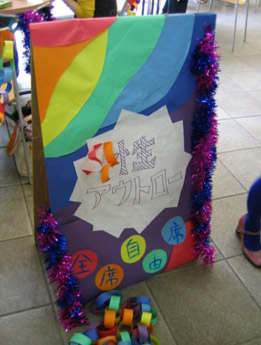 When I was a high school student in Japan, I was a closeted gay. I don’t think I even had that word - gay - to identify myself as. I knew the word “homo” and only revealed my sexuality in online forums. I had no idea how my friends and parents would respond if I came out because I had never seen anyone come out. I was comfortable with my sexuality but it was not until I left the country that I could tell my mother and my best friend that I was sexually/romantically attracted to men rather than women. I sometimes wonder, if I had not moved to New Zealand at the age of seventeen, would I have ever been able to come out? In a high school in Japan? I don’t think so.
When I was a high school student in Japan, I was a closeted gay. I don’t think I even had that word - gay - to identify myself as. I knew the word “homo” and only revealed my sexuality in online forums. I had no idea how my friends and parents would respond if I came out because I had never seen anyone come out. I was comfortable with my sexuality but it was not until I left the country that I could tell my mother and my best friend that I was sexually/romantically attracted to men rather than women. I sometimes wonder, if I had not moved to New Zealand at the age of seventeen, would I have ever been able to come out? In a high school in Japan? I don’t think so.
Hisako OSHIMA
Undergraduate student, ICU
【The article below is the same as the article that appears in the tenth issue of the CGS Newsletter.】
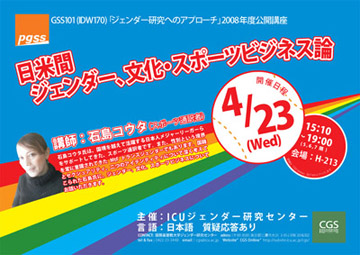 “Gender, Culture and Sports Business in the U.S. and Japan” was a special lecture hosted by CGS as part of the “Approaches to Gender Studies” course at ICU on April 28, 2008. The guest speaker was Ms. Kota Ishijima, an MtF (male-to-female) transgender who has been working as a sports interpreter in support of Japanese Major League Baseball players in Japan and the US. She covered a wide range of topics, such as surviving sexual violence, marriage and children, coming out of the closet, and Japanese/American sports marketing. The lecture was based on Ishijima’s own life experience as an individual who has always been acutely aware of differences between men and women, and between Japanese and American cultures.
“Gender, Culture and Sports Business in the U.S. and Japan” was a special lecture hosted by CGS as part of the “Approaches to Gender Studies” course at ICU on April 28, 2008. The guest speaker was Ms. Kota Ishijima, an MtF (male-to-female) transgender who has been working as a sports interpreter in support of Japanese Major League Baseball players in Japan and the US. She covered a wide range of topics, such as surviving sexual violence, marriage and children, coming out of the closet, and Japanese/American sports marketing. The lecture was based on Ishijima’s own life experience as an individual who has always been acutely aware of differences between men and women, and between Japanese and American cultures.
Kozue AKIBAYASHI
International Vice President, WILPF
(Women’s International League for Peace and Freedom)
【The article below is the same as the article that appears in the tenth issue of the CGS Newsletter.】
The Global Article 9 Conference to Abolish War was held at Makuhari Messe and in other locations in Japan from May 4 to 6, 2008, to disseminate the principles and values of Article 9 of the Japanese constitution around the globe.
The conference started with speeches by Nobel Peace Prize Laureate Mairead Corrigan-Maguire (Northern Ireland) and others, as well as live music and cultural performances.
“Women’s Power of Building Peace - Weaving Together Women’s Initiatives Worldwide” was one of the symposiums and workshops held on the second day. A total of six panelists from different countries participated in the discussion on women’s roles in peacemaking. As the facilitator of the workshop, I would like to report on some of the successful examples and suggestions for future activities that they shared with us.
IWATA, Mayu
Undergraduate student, ICU
【The article below is the same as the article that appears in the tenth issue of the CGS Newsletter.】
Gay and lesbian issues were featured in an NHK documentary series called HEART TV, on April 28 and 29, 2008. My overall impression was that they oversimplified sexual minority issues and did not challenge the binary opposition of heterosexuality and homosexuality at all. I am “quasi-bisexual” so I felt completely left out. While I understand that the program restricted its coverage to gays and lesbians as it was targeted to an audience with no background knowledge of sexual minority issues, I believe that it further obscured the differences among sexual minorities as well as the hidden potential of sexuality in general. My concern is that this could lead to a notional separation of one imagined body of “sexual minorities” from the “general public, ” resulting in the superficial, indifferent kind of understanding and acceptance that focuses on political correctness.
Akira MIYAMA
Administrative staff member
Delta G (www.delta-g.org)
【The article below is the same as the article that appears in the tenth issue of the CGS Newsletter.】
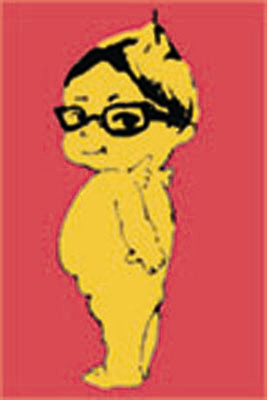
While the equation “women-loving women = lesbians” may function as a convenient logic for heterosexuals to categorize the unknown, incomprehensible other so they don’t have to think about it anymore, it can cause confusion and dilemmas for the women concerned. That is because a romantic/erotic experience a woman may have with another woman (or other women) does not necessarily always lead to a lesbian identity. The same is true for gender identity and national identity. Having a biologically female or male body does not always lead to a female or male identity, nor does having Japanese nationality (or having been raised in Japan) necessarily lead to a Japanese identity. To those who do not see how this kind of discontinuity works, my words probably mean nothing.
Izumi NIKI
CGS staff member
【The article below is the same as the article that appears in the tenth issue of the CGS Newsletter.】
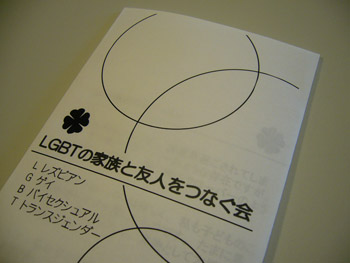 Suppose that your daughter, son, mother, father, or anyone in your family all of a sudden came out to you saying they were lesbian, gay, bisexual, or transgender. How would you respond to it? Shock, confusion, denial, distress... We still live in a society in which LGBTs are often misunderstood. Families are usually astounded and confused by the news of their loved one’s deviant sexuality, and sometimes refuse to accept it. The Association for Families and Friends of LGBTs has been working to create a community-based space for families and friends of LGBT people. I interviewed Kansai member Ms. Naomi Shimizu and Kanto members Ms. Ryoko and Mr. Takeshi Kobayashi about their experience as parents of LGBT children and their involvement in the organization.
Suppose that your daughter, son, mother, father, or anyone in your family all of a sudden came out to you saying they were lesbian, gay, bisexual, or transgender. How would you respond to it? Shock, confusion, denial, distress... We still live in a society in which LGBTs are often misunderstood. Families are usually astounded and confused by the news of their loved one’s deviant sexuality, and sometimes refuse to accept it. The Association for Families and Friends of LGBTs has been working to create a community-based space for families and friends of LGBT people. I interviewed Kansai member Ms. Naomi Shimizu and Kanto members Ms. Ryoko and Mr. Takeshi Kobayashi about their experience as parents of LGBT children and their involvement in the organization.
Zak
【The article below is the same as the article that appears in the tenth issue of the CGS Newsletter.】
The first time I heard the word “lesbian” was over 30 years ago when it was being shouted at me at school. I had no idea what it meant but the hostile intent behind the words made me keep silent. Years followed of being homophobically bullied at school while any understanding of my sexual orientation was kept buried inside. I knew I liked girls, and always had, but had nothing to relate these feelings too. Encounters with heterosexual friends always ended in heartbreak and confusion on my side and dispassion on theirs. I made new friends outside school who were much older. They were a mixed group; later I found out several were gay. There was no pressure to be heterosexual which was a relief, but I wasn’t out. We enjoyed chilling out with drugs and mixing music.